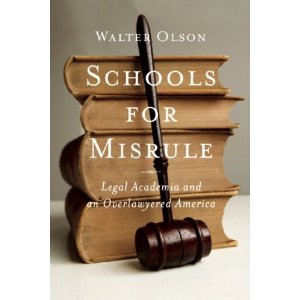But that hasn’t stood in the way of a push to sign up clients for law firms in the vicinity of the Frederick, Md. armed forces base. [WJZ, Army Times]
Canadian cultural protectionism
Canada’s TV establishment may call on Ottawa to prevent escape-via-Netflix [Michael Moynihan]
Beasley Allen drops Taco Bell beef suit
The fast-food chain, which had fought back against the large Alabama law firm with spirited ads defending its product, “said no money was exchanged and it is not changing any of its products or advertising.” [WAVY, earlier]
P.S. Cheeky new ad from Taco Bell aimed at the law firm: “Would it kill you to say you’re sorry?” [AP] More of this, please!
“Has the ADA swallowed the FMLA for employee medical leaves?”
Under the banner of combating discrimination against the disabled, Congress and the EEOC may together have quietly instituted a fairly momentous extension of the regime of federally mandated workplace benefits — in particular, imposing on even very small employers a new obligation to hold the jobs of employees taking some kinds of leave. [Hyman]
Bigger — and more entrenched — hedge funds
That could be the result of the new institution of elaborate compliance system mandates that could prove to be beyond the capacity of fledgling start-ups, per Marc Hodak:
So, the government decided it had to increase regulations [on] the one part of the financial services sector -– hedge funds –- that had nothing to do with the financial crisis. And because the government felt compelled to spend gobs of taxpayer cash to bail out financial institution[s] that were too big to fail, Congress created a raft of regulations whose main effect will be to crush entrepreneurship and compel waves of consolidation. And the people who pushed for this regulation, who inadvertently insisted that the fixed costs of doing business in America are not yet high enough, will be shocked to find that only the big survive.
April 19 roundup
- Environmental milestone? “Bolivia is set to pass the world’s first laws granting all nature equal rights to humans.” [JoNova via Coyote]
- Add another to the list of judges who file suits over critical discussion of their rulings, in this case by the losing party, a newspaper [ABA Journal]
- “Obama on presidential signing statements then … and now” [Bainbridge, Outside the Beltway]
- “The never-ending stream of futile petitions suggests that habeas corpus is a wasteful nuisance.” [Joseph Hoffmann and Nancy King, NYT, via Lat, Frank] A different view: Scott Greenfield, The Briefcase.
- Global warming suits “a misuse of the judiciary branch” [Laurence Tribe, Boston Globe via WLF]
- Competing for the HuffPo reader? On link between chemical exposures and cancer, Salon.com perpetrates “utter nonsense” [Orac, Respectful Insolence]
- Iqbal/Twombly: “Reports of pleading’s demise may have been exaggerated” [Wasserman, Prawfs]
San Francisco panel: places of public assembly should have to photograph patrons
“The Electronic Frontier Foundation joined civil liberties and privacy groups in criticizing a proposal from the San Francisco Entertainment Commission that would require all venues with an occupancy of over 100 people to record the faces of all patrons and employees and scan their ID’s for storage in a database which they must hand over to law enforcement on request. … Events with strong cultural, ideological, and political components are frequently held at venues that would be affected by these rules.” [EFF]
Visible taxes and invisible regulations
I’ve got a new post up at Cato at Liberty noting (after Iain Murray) that the lack of an annual “Regulation Day,” along the lines of tax-filing day, makes the cost of regulation even less apparent to the citizenry. I cite examples from the realms of medical devices, credit cards, and power plants (& Ivan Osorio, American Spectator).
Skate park bristling with signs
Would you want to play in it? [Kaboom via Free-Range Kids]
Washington Times review; Yale Daily News
Attorney Ray Hartwell of Hunton & Williams reviews a certain “excellent,” “wide-ranging” and “richly informative” volume. It’s one of my  favorite reviews so far; among its other virtues, it gets into the conflicting institutional pressures on law schools that underlie some of the ideological drift. For other reviews, see our posts here, here, and here. Why not order your copy — or a gift copy for a graduate or favored relative — today?
favorite reviews so far; among its other virtues, it gets into the conflicting institutional pressures on law schools that underlie some of the ideological drift. For other reviews, see our posts here, here, and here. Why not order your copy — or a gift copy for a graduate or favored relative — today?
More: Today’s Yale Daily News is out with a story by reporter Nikita Lalwani on the cycle of inbreeding in high-end legal academia: top law schools draw heavily on a few elite undergraduate colleges for their student body, and in turn supply most of the future law faculty for law schools around the country. I’m quoted:
“Harvard and Yale graduates like complicated law more than the general public,” [Olson] said. “Legal academics like these complications because they are intellectually stimulating, but most lawyers just want to be able to advise their clients to either do or avoid doing something.”
And Chicago’s Brian Leiter is quoted saying something with which I’d fully agree:
In an email to the News Apr. 13, Leiter said he finds it troubling that just six schools control so much of the legal academic world.
“It is not a healthy situation, and no doubt accounts for a lot of what ails legal scholarship and explains the legal academy’s susceptibility to intellectual fads,” he said. “As long as the fad takes hold at a couple of feeder schools to legal academia, it’s guaranteed to spread.”
